Potlotek First Nation sues Nova Scotia over moderate livelihood fishery
Band was able to catch fish, but regulations prevented it from selling the harvest

The Potlotek First Nation is launching alegal action against the Nova Scotia government over the right to sell seafood harvested through a moderate livelihood fishery.
The move comes after Sipekne'katik First Nation filed a similar suitearlier this month.
"Our right to a moderate livelihood was affirmed by the Supreme Court of Canada, yet Nova Scotia's regulations prevent us from fully exercising our rights," Potlotek Chief Wilbert Marshall said in a news release Tuesday.
In 1999, theSupreme Court of Canada handed down its decision in the case ofMi'kmaw fisher Donald Marshall Jr., of Membertou First Nation. The landmarkcaseaffirmed the Mi'kmaw treaty right to hunt, fish and gather in pursuit of a moderate livelihood.
Fishery launched in the fall
Potlotek launched its first self-regulated lobster fishery last October. It ran through to December.
The trouble came in selling the catch.
Under provincial regulations, it's prohibited to buy fish caught without a commercial fishing licence issued by the federal Fisheries Department. It's also prohibited to buy fish caught outside federal or provincialregulations relating to size, season and quota.
"The province sent letters to all the buyerstelling them not to buy our product, any fish caught by our moderate livelihood fishermen," said Wilbert Marshall.
Requests to work with the Nova Scotia government on the regulations have gone unanswered, according to the news releaseissued by the Assembly of Nova Scotia Mi'kmaw Chiefs.
"I think what it comes down to is politics. The province is scared to make the call," said Marshall.
Federal responsibility
Premier Stephen McNeilsaid earlier this month the Nova Scotia government hasa "different point of view" on its responsibilities in the matter.
"We've said all along that [a] buyer's licenceis related to a fishery that is described in the Fisheries Act laid out by the national government,"McNeil told reporters in response to the court action filed by theSipekne'katik First Nation.
Potlotek's livelihood fishery plan includes a second lobster fishing season to run concurrent with the commercial lobster fishery in the spring.
"Regardless, we're going to be out there selling our product," said Marshall. "It would be nice if they worked with us,though."
Fishing industry reaction
Meanwhile, others in the industry are careful not to take sides.
"It's a complicated question, for which I do not have the answer," said Stewart Lamont, managing director of Tangier Lobster Company.
As a licensed buyer, he stressed that he must comply with the licensing requirements imposed by the provincial government.
Healso made it clear that he'd prefer to see the matter settled at the negotiating table, as opposed to the courts.
"It is the government of Canada whose jurisdiction is on harvesting issues, and ultimately they have to negotiate ... with First Nations and with non-Indigenous commercial fishermento come to the kind of compromise that the industry badly needs," he said.
Over the past two decades of fruitless negotiations, buyers have not been welcomed at the table.
"We're not seen as part of that process" said Lamont. "That's the real irony. Nowall of a suddenwe are thrust into the middle of a debate and a dispute that really hasn't concerned us."
If changes are made, Lamont said hebelieves any moderate livelihood fishery must be seasonaland based on conservation.
Lobster council 'supports ongoing dialogue'
The Lobster Council of Canada declined an interview with CBC Newson Wednesday.
"The Lobster Council of Canada (LCC) supports ongoing dialogue and negotiations between stakeholders and rights holders to resolve the management and regulation of East Coast fisheries for First Nations and commercial harvesters," wrote executive director Geoff Irvine in a statement.
MORE TOP STORIES












_(720p).jpg)


 OFFICIAL HD MUSIC VIDEO.jpg)
.jpg)



























































































